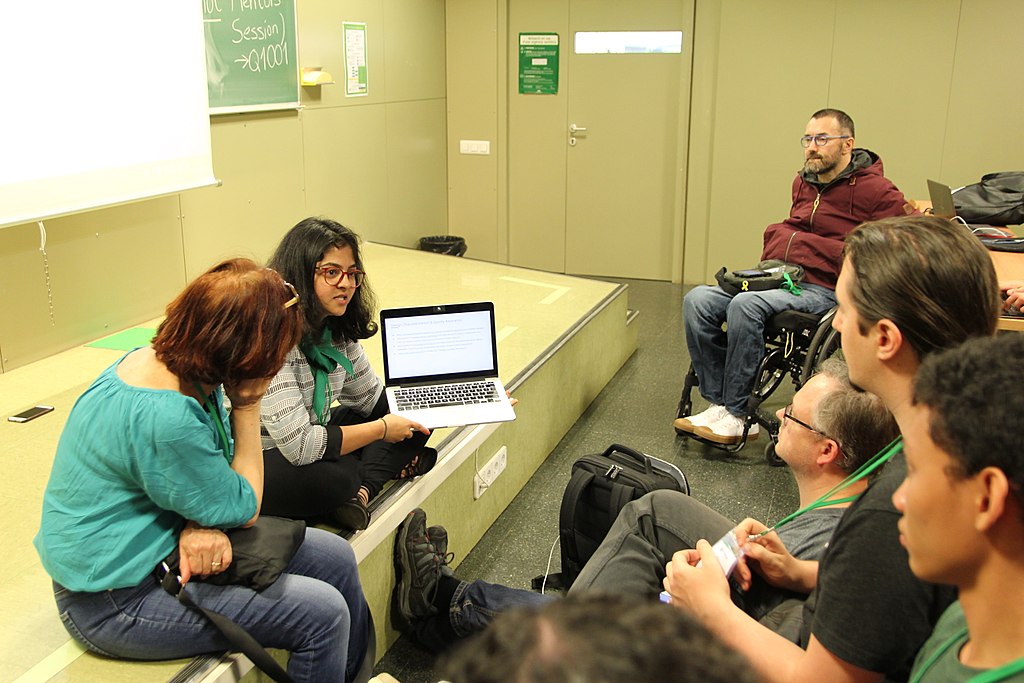We’re always looking for ways to strengthen the open source ecosystem. Over the past two months, the Developer Advocacy team at the Wikimedia Foundation collaborated with two open source initiatives: Mozilla’s Open Source Student Network (OSSN) and TeachingOpenSource.org’s Professors’ Open Source Software Experience (TOS and POSSE, respectively). OSSN is designed to bring more students into open source projects, while POSSE aims to provide more professional development resources for professors.
Mozilla’s pilot project, which is currently underway at colleges in the United States and Canada, aims to help university students find suitable open source projects to engage with. Before its launch, Mozilla researched the state of open source on college campuses, as well as criteria that students might consider in choosing a project. Based on this research, Mozilla developed an overview template for project selection that presents the four most relevant (and often not properly surfaced) criteria at a glance: the mission of the project, technology, time needed for setting up the development environment, and how to connect with the community.
POSSE, meanwhile, provides professional development experience to professors interested in teaching open source through Humanitarian Free and Open Source Software (HFOSS) projects. POSSE began as an outreach effort by Red Hat to the higher education community.
Earlier this year, our team, met with the contributors to the Mozilla’s Open Source Student Network (OSSN) and POSSE initiative at the LibrePlanet conference in Cambridge, Massachusetts. We saw an opportunity to further support student contributors on the Wikimedia projects by collaborating with these two initiatives.
There are two primary reasons why we are excited about this collaboration.
First, we have received quite a lot of requests from professors or students interested in teaching open source in academia through Wikimedia projects. We get asked how to assess projects and incorporate them into semester-long coursework. We’ve always wondered how to help them best.
In the past, we have partnered directly with university faculty to help shape projects for their students, which are both educational for them and beneficial for us. For example, last spring we worked with graduate students and faculty in Boise State University’s Technical Writing program to audit and evaluate technical documentation for our Cloud Services team. The students were able to advise a real world client (our team), and we used their valuable recommendations to inform our approach. We would love to be able to provide focused support like this to everyone who asks. We are often able to provide a project showcase and developer support help, but we find we also have to defer many requests.
Second, in our year-long research study with 61 new developers to Wikimedia projects, we learned that most new developers who we attract are working professionals. However, students get onboarded through our targeted outreach efforts via mentoring programs such as Google Summer of Code, Outreachy, Google Code-in and mentoring programs at hackathons.
On the whole, this also ties into our bigger goal of collaborating with other FOSS communities for engaging technical contributors.
This collaboration with both the initiatives in its initial state is quite straight-forward and not quite resource intensive! We’ve proposed five newcomer-friendly projects to be listed in the OSSN’s directory of projects: https://projects.ossn.club/. The project and mentor names are listed below:
- ORES, Aaron Halfaker
- Extension:Newsletter, Tony Thomas
- Huggle, Petr Bena
- WikiEdu Dashboard, Sage Ross
- Kiwix, Emmanuel Engelhart and Stephane Coillet-Matillon
“Joining forces with Wikimedia for findings more effective ways to support University students while they are trying to contribute code to Open Source Projects is exciting! Students are looking to contribute to projects that are simple, diverse and have an impact; which is precisely what Wikimedia projects offer. I appreciate the time effort the project maintainers are putting aside for onboarding and supporting new contributors and looking forward to working with them.” – Christos Bacharakis, Mozilla Open Source Student Network – Program Manager
For POSSE, we are now listed as an organization in their directory of HFOSS projects under the Education category. The link contains getting started instructions. When we are approached by students and professors, we are willing to offer help!
“We’re excited to have the Wikimedia Foundation working with TOS to engage students in Wikimedia projects,” said Gregory Hislop of the TOS Coordinating Committee. “Today’s students have grown up using Wikipedia, and they are quite interested in learning about the technology and community behind the project. The educational goals of Wikimedia also provide an excellent introduction to computing for social good. We appreciate the Wikimedia Foundation’s leadership in providing opportunities for students.”
With this collaboration, we are hoping to engage more university students in contributing to open source projects and support professors in their efforts of teaching open source through Wikimedia projects. We are looking forward to learning from the research findings that Mozilla will conduct post completion of the first pilot, which we could then leverage to improve some of our processes and workflows of supporting new developers. We would also be curious how professors use our projects to teach in a classroom setting, which we could then be shared with our collaborators in academia.
Srishti Sethi, Developer Advocate, Technical Engagement
Sarah Rodlund, Technical Writer, Technical Engagement
Wikimedia Foundation



